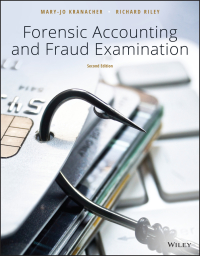Question
indicate whether the following statements are TRUE OR FALSE. [ Select ] [True, False] 1. Selling of accounts receivables is referred to as discounting or
indicate whether the following statements are TRUE OR FALSE.
[ Select ] ["True", "False"] 1. Selling of accounts receivables is referred to as discounting or factoring, but not pledging.
[ Select ] ["False", "True"] 2. A company factored $30,000 of its accounts receivable and was charged a 2% factoring fee. The journal entry to record this transaction would include a debit to Cash of $30,000, a debit to Factoring Fee Expense of $600, and credit to Accounts Receivable of $30,600.
[ Select ] ["True", "False"] 3. A high accounts receivable turnover in comparison with competitors suggests that the firm should tighten its credit policy.
[ Select ] ["True", "False"] 4. The direct write-off method of accounting for bad debts records the loss from an uncollectible account receivable when it is determined to be uncollectible.
[ Select ] ["True", "False"] 5. Companies follow (comply with) both the matching principle and the materiality principle when applying the direct write-off method.
[ Select ] ["True", "False"] 6. The advantage of the allowance method of accounting for bad debts is that it identifies the specific customers who will not pay their bills.
[ Select ] ["True", "False"] 7. When using the allowance method of accounting for uncollectible accounts, the entry to record the estimated bad debts expense is a debit to Bad Debts Expense and a credit to Allowance for Doubtful Accounts.
[ Select ] ["False", "True"] 8, After adjustment, the balance in the Allowance for Doubtful Accounts has the effect of increaseing Accounts Receivable to its estimated realizable value.
[ Select ] ["False", "True"] 9. When using the allowance method of accounting for uncollectible accounts, the entry to write off Jeannie's uncollectible account is a debit to Allowance for Doubtful Accounts and a credit to Accounts ReceivableJeannie.
[ Select ] ["True", "False"] 10. Allowance for Doubtful Accounts is a contra asset; its balance is added to Accounts receivable.
[ Select ] ["True", "False"] 11. The allowance method of accounting for bad debts matches the estimated loss from uncollectible accounts receivable against the sales they helped produce.
[ Select ] ["True", "False"] 12. The aging method of determining bad debts expense is based on the knowledge that the longer a receivable is past due, the lower the likelihood of collection.
[ Select ] ["True", "False"] 13. A company has $80,000 in outstanding accounts receivable and it uses the allowance method to account for uncollectible accounts. Experience suggests that 6% of outstanding receivables are uncollectible. The current credit balance (before adjustments) in the allowance for doubtful accounts is $1,200. The journal entry to record the adjustment to the allowance account includes a debit to Bad Debts Expense for $4,800.
[ Select ] ["True", "False"] 14. Since pledged accounts receivables only serve as collateral for a loan and are not sold, it is not necessary to disclose the pledging.
[ Select ] ["True", "False"] 15. A company using the percentage of sales method for estimating bad debts has sales of $350,000 and estimates that 1.0% of its sales are uncollectible. The unadjusted balance in Allowance for Doubtful Accounts is a $300 credit. The estimated amount of bad debts expense is $3,200
Step by Step Solution
There are 3 Steps involved in it
Step: 1

Get Instant Access to Expert-Tailored Solutions
See step-by-step solutions with expert insights and AI powered tools for academic success
Step: 2

Step: 3

Ace Your Homework with AI
Get the answers you need in no time with our AI-driven, step-by-step assistance
Get Started


